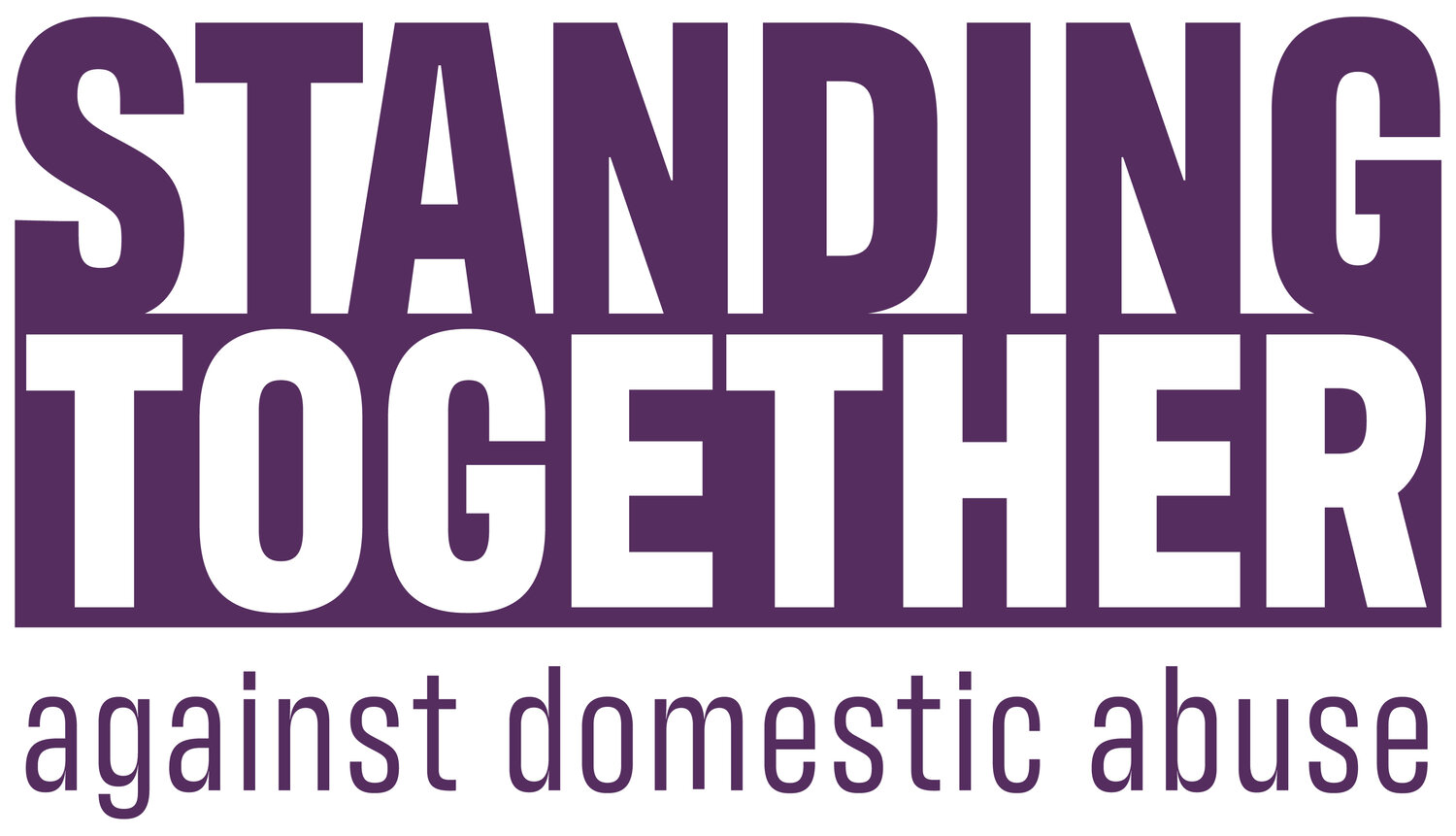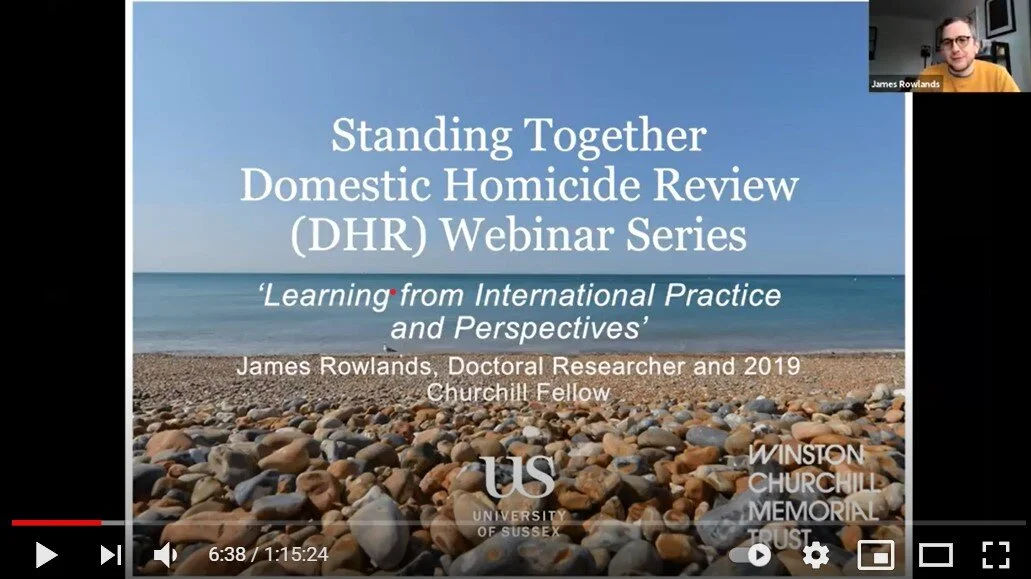DHR Learning the Lessons: Webinar Series
Building on Standing Together's launch of the MOPAC funded London Domestic Homicide Review (DHR) Case Analysis and Review of Local Authorities DHR Process (the Executive Summary of which is available here), Standing Together is hosting a series of free webinars through 2021 to better 'Learn the Lessons' of DHRs. In each webinar, speaker(s) will present on a theme or an issue relating to DHRs, drawing on their research, practice or lived experience. There will also be an opportunity for a Q&A and discussion.
Please see below for information about and registration details for our upcoming webinars, and the recording and PowerPoint presentations from our past events.
Upcoming Webinars:
We do not currently have any further sessions in our DHR Learning the Lessons series scheduled. We will update this webpage with further events when relevant.
Previous Webinars:
International Perspectives:
The speaker for our first session was James Rowlands around the theme of International Perspectives. James is a DHR chair and a Doctoral Researcher at Sussex University. James talked about the findings from his 2019 Churchill Fellowship, during which he investigated international approaches to domestic / family violence death reviews, visiting Australia, Canada, New Zealand and the United States. You can access his fellowship report at https://www.wcmt.org.uk/users/jamesrowlands2019.
James discussed the principles of death review’s, looking at how these processes are established and how they operate, including how they go about identifying learning and making recommendations to improve practice and policy. Drawing on these international perspectives, James presented key findings and recommendations for the development of DHRs in England and Wales.
The webinar took place January 20th 2021. The webinar is available to view below or by following this link and James’ PowerPoint presentation can be downloaded using the below button.
Intersectionality in DHRs:
The speaker for our second session was Pragna Patel around the theme of Intersectionality in DHRs. Pragna is a founding member and director of Southall Black Sisters’ advocacy centre. For 40 years, she has been centrally involved in some of SBS’s most important cases and campaigns involving domestic violence, immigration and religious fundamentalism. In this session Pragna discussed what intersectionality is, and isn’t, and how an intersectional framework can be better embedded in the DHR process. This session would be particularly useful for DHR commissioning bodies, DHR chairs, and those who have been, or will be, DHR panel members.
The webinar took place Friday, February 26th, 2021. The webinar is available to view below or by following this link and Pragna’s PowerPoint presentation can be downloaded using the below button.
Fatal Adult Child to Parent Abuse:
The speaker for our third session was Thien Trang Nguyen Phan on the theme of Fatal Adult Child to Parent Abuse. Thien Trang has over 12 years of experience working in the field of domestic abuse and violence against women and girls. She is currently a Doctoral Researcher at the Policing Institute for the Eastern Region (PIER), Anglia Ruskin University, where she focuses on the abuse of parents by their adult children. The session focused on her analysis of DHRs involving adult children using fatal violence towards a parent(s) to highlight the frequent themes specific to these cases, and what is needed to move forward and keep survivors safe.
The webinar took place Wednesday, March 17th, 2021. The webinar is available to view below or by following this link and Thien Trang’s PowerPoint presentation can be downloaded using the below button.
Local DHR Processes
Our fourth session was on local DHR processes. DHRs are a statutory responsibility for Community Safety Partnerships (CSPs). Although there is national guidance in conducting DHRs, research shows that DHR processes are nationally inconsistent and there is a need to streamline approaches. This webinar will explore the challenges local authorities face in conducting DHRs and present local best practice models to improve learning and practice. We will hear from those leading on improving DHR processes in their local area, within London with Shabana Kasuar, and in Hertfordshire with Danielle Davis and Katie Dawtry.
The webinar took place Tuesday, April 27th, 2021. The webinar is available to view below or by following this link and the speakers PowerPoint presentations can be downloaded using the below button.
The webinar took place Tuesday, 27th April, 2021 from 1pm - 2:30pm on Zoom.
Mental Health and Domestic Homicides: A Qualitative Analysis
The speaker for our fifth session was Dr Marilia Calcia on Mental Health and Domestic Homicides. Dr Marilia Calcia is a consultant psychiatrist at King’s College Hospital and South London and Maudsley NHS Foundation Trust, and a doctoral researcher at the Section of Women’s Mental Health, King’s College London. Her current research focuses on the response of healthcare services to perpetrators of domestic violence and abuse.
This webinar described themes surrounding the mental health of victims and perpetrators of domestic homicides, based on a qualitative analysis of 10 Domestic Homicide Review (DHR) overview reports selected by Standing Together for the London DHR Case Analysis and Review, published in 2020. Themes analysed include health services’ responses to DVA, inter-agency working, risk assessment, substance use, treatment and follow up for mental health problems.
The webinar took place Wednesday, May 19th, 2021 from 1pm to 2:30pm on Zoom.
The webinar is available to view below or by following this link and Dr Calcia’s PowerPoint presentation can be downloaded using the below button.
Non-Homicide Domestic Abuse Related Deaths
Our sixth session explored Non-Homicide Domestic Abuse Related Deaths, with speaker Sarah Dangar from AAFDA. Sarah is the Operations Manager and Deputy CEO at AAFDA, a centre of excellence for reviews after domestic abuse related deaths. She regularly sits on the Home Office Domestic Homicide Review Quality Assurance Panel and in this role has quality assured over 200 Domestic Homicide Reviews. Sarah is a 2020 Winston Churchill Fellow investigating models of reviewing non-homicide domestic-abuse-related deaths in Australia and the USA. Sarah aims to use her findings to make recommendations that will influence national policy change in the UK.
The webinar took place Wednesday, July 12th, 2021 from 1pm to 2:30pm on Zoom.
The webinar is available to view below or by following this link and Sarah’s PowerPoint presentation can be downloaded using the below button.
If you would like further information on our webinar series please email dhradmin@standingtogether.org.uk


